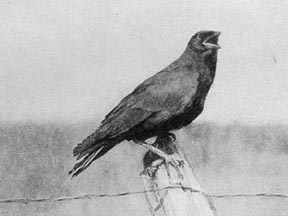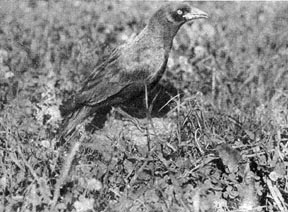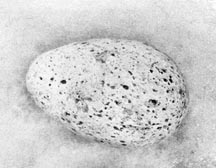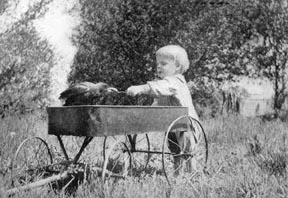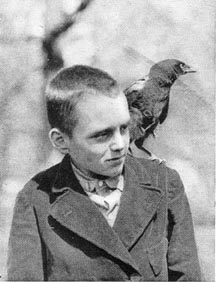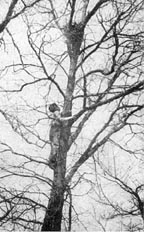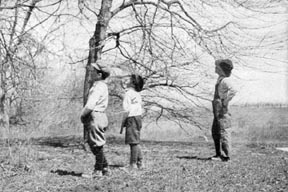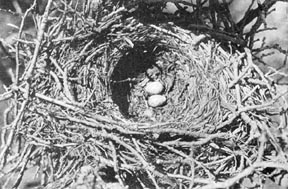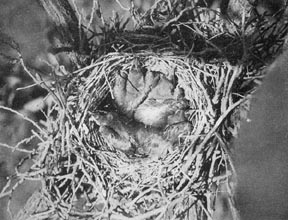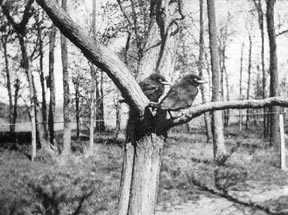A JOLLY OLD CROW
page 179
The Naturalist was very much annoyed. Something was taking his turkey eggs. He could look with composure upon the loss when the polecats robbed a hen’s nest, and did not take it as seriously as might be when the rabbits girdled his young apple trees. His White Holland turkeys were his special delight, however, and it was quite a different matter when anything happened to them. They were excellent birds of a breeding which gave their owner cause for pride, and besides, he was selling the eggs for a quarter apiece for hatching purposes. Twenty-five cents a meal for the denizens of the wood which ate a dozen or more times a day, seemed a rather high price. He had smiled at Tommy Jones’s displeasure when the cooper hawk was catching his chickens, but now it was the Naturalist’s turn to question the habits of some of his neighbors. It did not take long to find the culprit, but to catch him was a different matter. The turkeys’ white feathers made them very conspicuous, and they could be seen for a long distance. A black old rascal of a crow sat on the top of a high tree in the little wood, and watched when one of them would go to her nest. As soon as she left, he immediately made a dinner of the egg. For a time the Naturalist was inclined to get angry and to shoot the old crow (in case he should get a chance). After a time he became ashamed of the idea that he should find it necessary to go gunning for any wild creature that lived in the little wood, and decided that if he could not have turkeys without such a performance, he would sell the turkeys, so sell them he did.
He was not the only one who had turkeys, however, and the black old bird and others of his kind, ate most of the turkey eggs in the whole neighborhood. At one time the old scamp found that the Naturalist had a nice flock of baby chicks, and took to dining on them. He conferred similar attentions upon the neighbors also until Tommy Jones saw the old fellow after his dinner, and shot him--killed in the very act of carrying off a young chicken, there was no question but that Tommy had killed the identical crow that was causing so much mischief. There were still many crows about, and they came around the Naturalist’s home as freely as before, but, much to his relief, they did no trouble the baby chicks any more. The fact was thus established that only the one crow in that flock was taking the young chickens, although there were others that liked turkey eggs.
The crow is a very intelligent bird and learns easily. One who watches them closely will soon learn that there is a great difference in their individual peculiarities. Had it not been for the execution of the old sinner which was taking the little chickens, probably all the crows in the neighborhood would have soon learned the same trick. The nests of both hens and turkeys were robbed so persistently that the thirteen guns which had been loaded for the red-tails were trained upon the crows at every opportunity. However, this fact seemed to give them little anxiety, for they were abundantly able to look out for themselves. When no one was watching they would alight in a barn lot or orchard, while one of their number kept watch in some commanding position. At the least suspicious sign he would give the alarm and the whole flock would slip away before a man or a boy could get within gunshot. The Naturalist never worried on their account, for he felt very sure that no matter how many boys and guns were watching for them, there would be no apparent diminution of their numbers.
The poor crow is almost universally distrusted. In the wooded regions he is in disrepute because of his habit of pulling up sprouting grain. Some also accuse him of injury to melons, and a scarecrow of some kind is a common sight in the small fields. In Iowa he is maligned as an egg-sucker and accused of catching the young poultry. In the Mississippi valley the grain fields are so extensive that the small amount of grain which he destroys is seldom missed. The fact is that he is guilty of all the counts in the indictment, but “catching comes before hanging,” and the crow has learned how avoid the numerous pitfalls designed for his undoing.
Such friends as the Naturalist are fully alive to the good traits, which are not inconsiderable, for he renders great service in the destruction of grubs, beetles, and young field mice. Although such would give him all his due, they can hardly be blind to his shortcomings. However, it would be unwise to condemn him in too sweeping a fashion, for in many localities he is undoubtedly a valuable ally in overcoming certain pests. It is a misfortune when a misguided legislative body places a bounty on his head. While at certain times in certain localities his mischief seems to justify his destruction, the annoyance caused by his pranks is a sufficient incentive without adding a bounty, which will also be effective in localities where he renders a service that more than offsets his injuries.
The Naturalist was very much interested in the elaborate notes by means of which the birds communicated with each other, and spent many months learning to imitate their call. In time he came to give the call so perfectly as to deceive strange crows which had not learned to look with suspicion upon a call from an unusual position. One spring day when the Naturalist was renewing his acquaintance with the first arrivals after a winter’s absence, he amused himself by hiding and watching the movements of flocks of crows which were passing. There were numerous crows passing by, all bound in the same direction. They did not come in large flocks, but two or three at a time, and kept coming for a considerable time. An old sentinel in the top of a tall tree called, “Caw-caw, caw-caw, caw-caw, caw,” to each bunch that passed. After watching them for some time and noting that he gave the same signal every time, without variation, the Naturalist became very anxious to learn the meaning of this particular signal, and the place to which it directed the passing birds.
After the sentinel had give his signal to a passing bird and it had gone on for a little distance, the Naturalist gave three short, quick notes, in imitation of one of their alarm signals, “Caw, caw, caw.” The bird that had passed, at once turned and came back, circling about in search of the source of the call. Seeing nothing, he again started off in the same direction in which he had been going. Again the Naturalist called, and again he came back. The third time he responded to the call and wheeled about overhead. The fourth time he flew directly to a nearby tree and called, “Caw, caw, caw,” rather slowly. Upon receiving his answer he detected the deception, and flew away as rapidly as possible, paying no further attention to the calls. There was so much fun in watching the birds trying to find the lost member of their tribe, that the Naturalist repeated the experiment at intervals during the morning with similar results. Some birds would solve the mystery sooner than others, but he was able to deceive a considerable number of them.
After learning to imitate their calls, the Naturalist took keen delight in trying to ascertain the meaning of their various notes. On one occasion a pair of crows located a horned owl near their nest. Upon giving the alarm there were soon nineteen crows tormenting one poor owl. They drove him from tree to tree, all the time cawing in the most distressing manner, until the bird seemed fairly distraught. For a long time after that occasion the Naturalist enjoyed hiding and repeating the alarm signal which he had heard given at that time. Soon crows would be coming from every direction and looking for the owl, or for some other occasion for a general congregation. Once, when the Naturalist was enjoying a stroll through a bit of woods several hundred miles from his home, he remarked to friends that he had not seen a crow in that neighborhood. When assured that crows were present in the locality, he at once gave the alarm call and astonished his friends by bringing together a goodly flock within a few minutes.
These experiments convinced the Naturalist that the crow has a more highly developed system of communication by means of vocal notes, which more nearly approach spoken language than any other native bird. He also became convinced that by devoting sufficient time to it one could come to understand the meaning of the various notes, and possibly interpret their communications.
One spring the Naturalist could not resist the temptation to take a young crow from the nest before it could fly. It was fed freely with bread and milk and such table scraps as it would eat. The youngster soon became very tame, and made himself at home among the trees about the house. He made friends with the bantam hen and with a skunk that lived there at the time. On occasion they would all investigate the possibilities of dinner from the same pan, as all were permitted to help themselves from the supply of table scraps which Mrs. Naturalist set out for them. He was a most interesting bird, but suspicious of every stranger. When visitors came and desired to make his acquaintance he would usually take himself to the top of some of the tallest trees and caw, but would refuse to come down at the call of the Naturalist. He was very diffident about having his picture taken, and although he would take food from the Naturalist’s hand when no one was near, if the latter had no suspicious implements, it proved a very hard matter to get him to pose for a photo. One morning the Naturalist had tried for a very long time to get a picture without success, and had gone to the house. On looking out he saw the baby feeding him bread and milk with a spoon, and snapped a most unexpected pose of both.
Although he never learned to talk, Jim Crow learned a very good imitation of a laugh. He would alight on any chance object near the Naturalist and laugh heartily at the slightest excuse. He seemed to have no understanding of the call of the wild crows that came about the place, and could never seem to know quite what to make of their noise when they alighted in the trees and tried to scrape an acquaintance. He laughed so much that he was entitled to his name of “Jolly Jim Crow.” However, some of his pranks did not seem so funny to the Naturalist. One day he was feeding with the hens, when he pecked an old hen so hard on the head, that she reeled for a moment and then fell dead. Jolly Jim laughed very hard at this, and for a moment the Naturalist was tempted to wring his neck.
One morning the Naturalist found him with a wound on his own head, the result of some kind of an accident. His laugh that day had a sob in it, and poor Jolly Jim Crow soon died. In spite of his mischief, he was missed very much by his friends who have continued to look forward to another tame crow who would laugh at the misfortunes of the tenants of the barnyard.
One spring the boys decided that it was time for them to be naturalists on their own account, and to make some observations according to their own notions. They decided that crows would be very good subjects, and tramped the woods along the river for miles, as well as carefully examining every part of the little wood in search of their nests. After spending several hours in searching, they found a nest in a tall tree near the river, and about a mile from home. It was no mean climb to the nest, and Kent being the eldest, claimed the privilege of first examination.
They kept a careful record of all their observations. They were anxious to determine whether the crow laid every day or only every other day. Their book showed that they found the nest on April 10, and that it contained one egg. April 11, there were two eggs and the 12th there were three eggs. The fourth egg was not present in the nest until the 14th, which puzzled them somewhat, as it indicated that the egg laying was not entirely regular. Five eggs were laid in all.
When it came to getting a picture of the nest, they had to fall back upon the Naturalist, who climbed the tree to a point above the nest, and strapping himself to a branch took a photo from above, as he had done of the cooper hawks’ nest. There were only two eggs in the nest when the picture was taken, but he did not enjoy dangling so high above the earth enough to go back again, just to get a few more eggs in the same kind of picture.
When the incubation began the boys continued their interest to see how long it would take them to hatch. On the first of May they found two young ones, and on the second there were four, while the next day the fifth egg had hatched also. The boys were pleased to learn that it required three weeks for crows’ eggs to hatch, the same as for hens’ eggs. The nest was composed of coarse twigs, with a deep depression about the size and shape of the inside of a man’s hat. The inside of the nest was lined with strips of soft bark. The boys visited the nest frequently, to see how fast the little crows grew. At first they were naked little things which seemed to be all mouths, but they grew rapidly, and soon were covered with black feathers. When the youngsters were twenty days old the Naturalist was prevailed upon to climb the tree a second time and get a picture of the young ones. One youngster died in the nest, whether from so much competition he was unable to get sufficient food, or for some other reason, the boys could never quite determine. When they were thirty days old the last of the young ones day left the nest.
Before their observation was completed they had found four more crows’ nests, and were becoming as ardent naturalists as their daddy. They have since taken up the study of the crow language, also, and who knows but that the whole family of Naturalists will be conversing in the crow tongue before long?
Next Chapter
Book Contents
Return to Bob's Page
